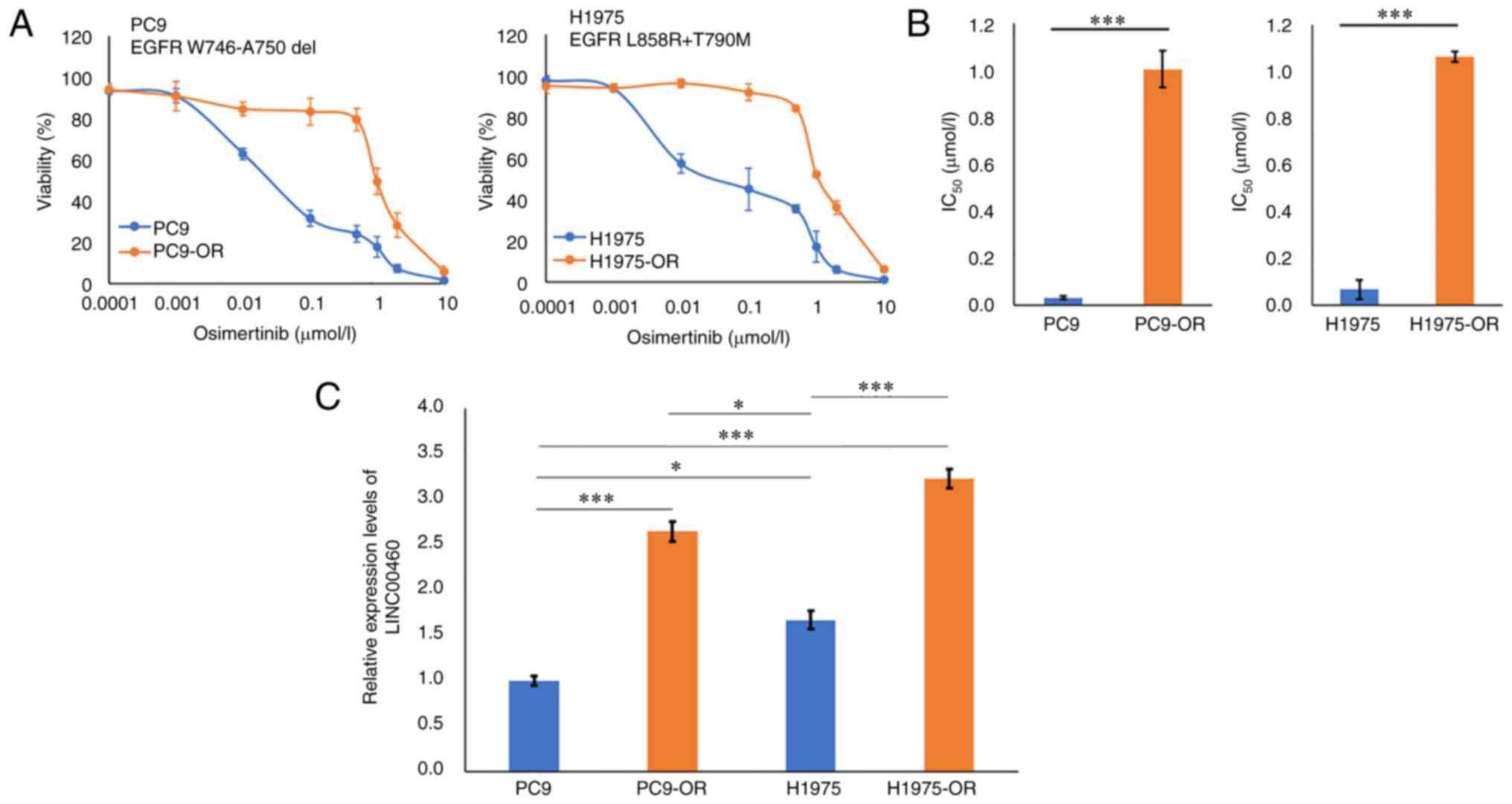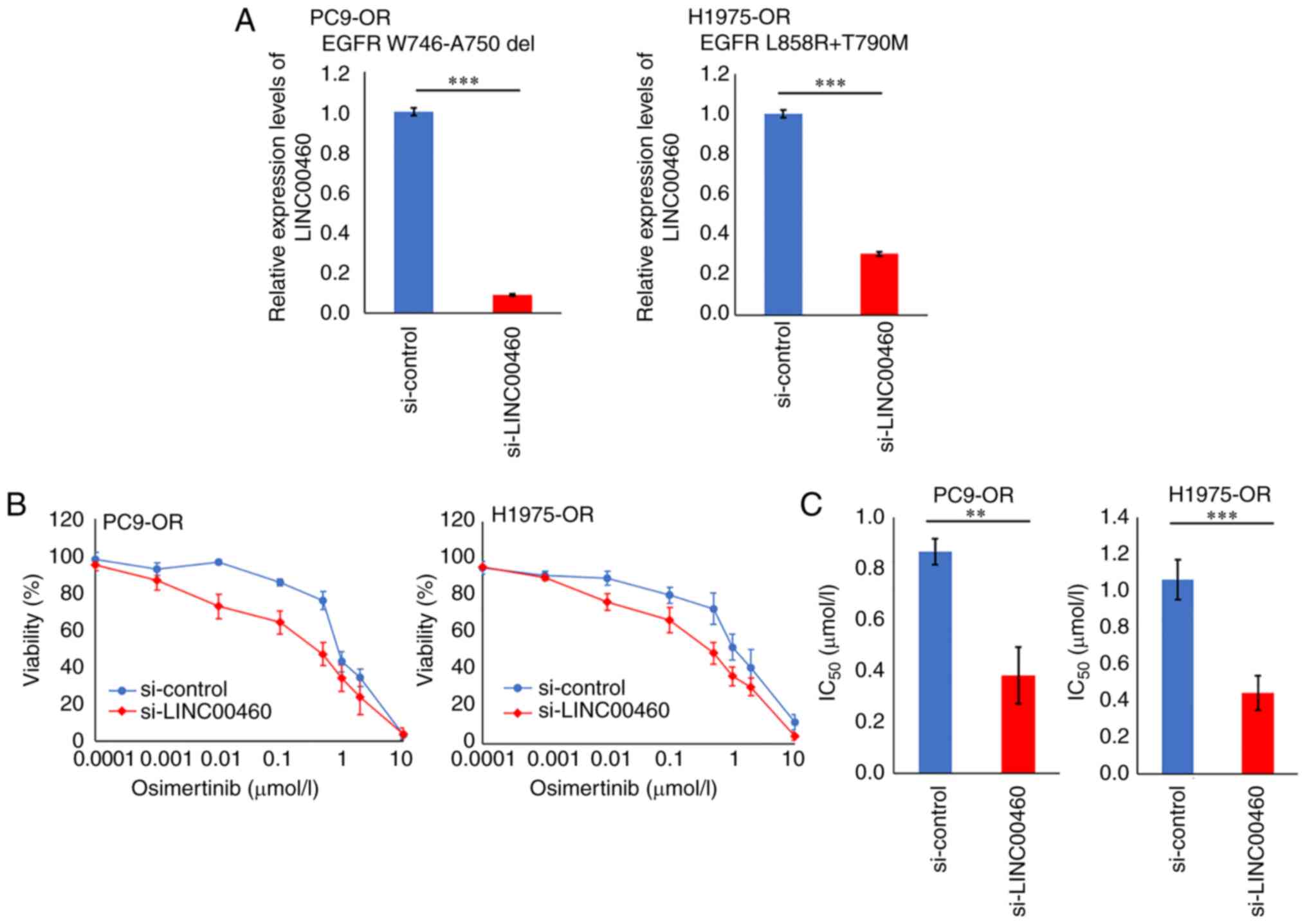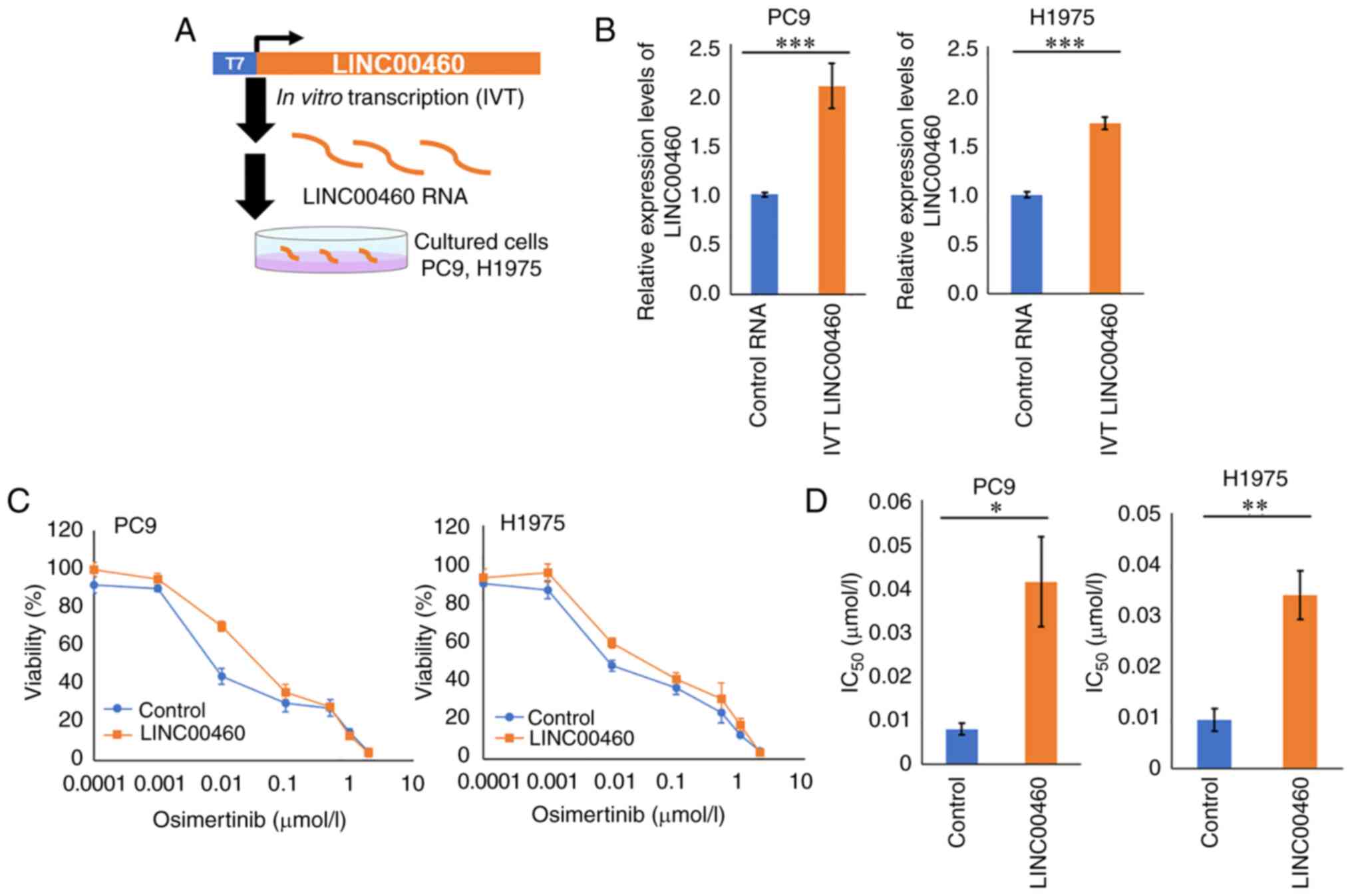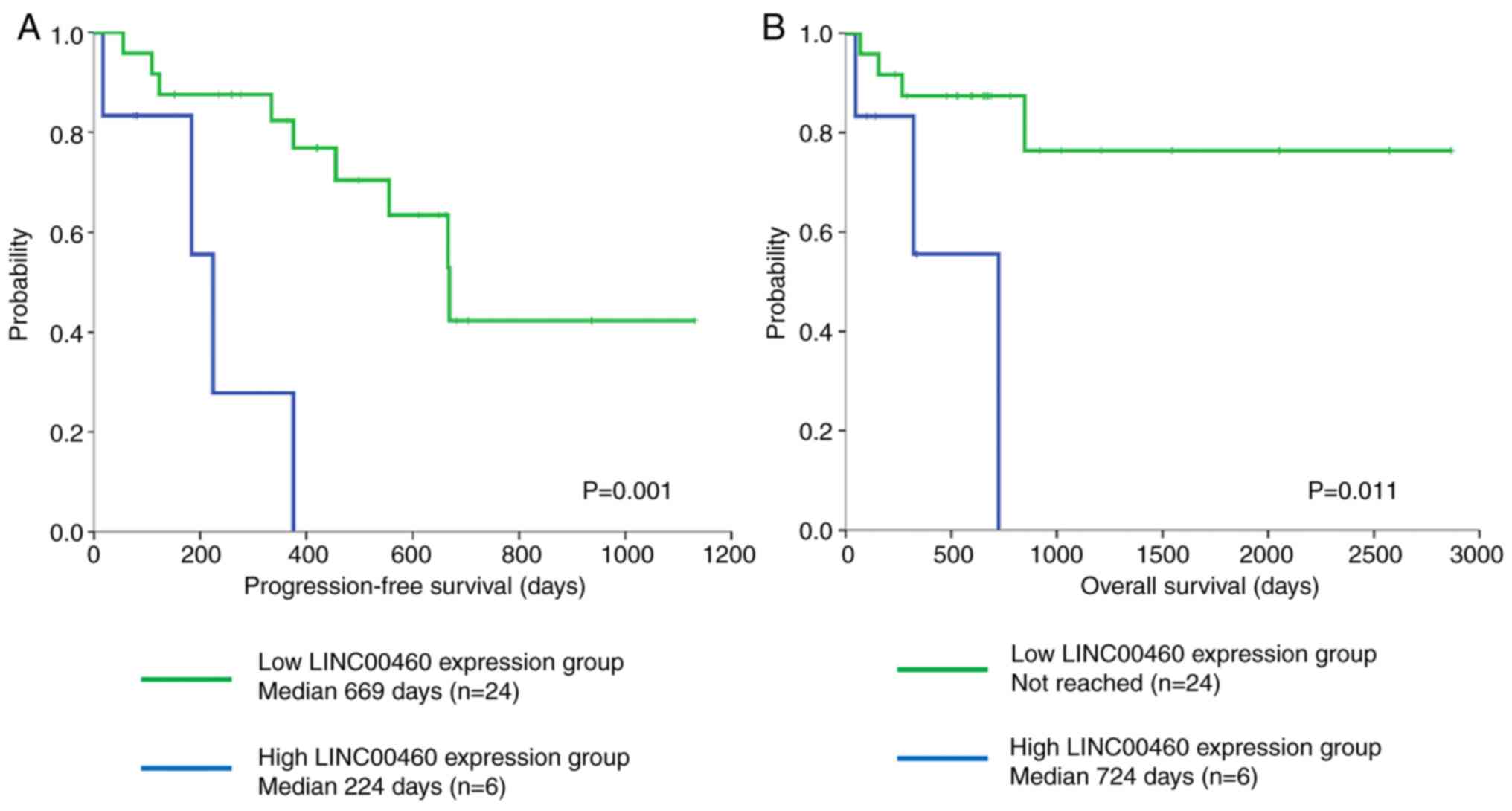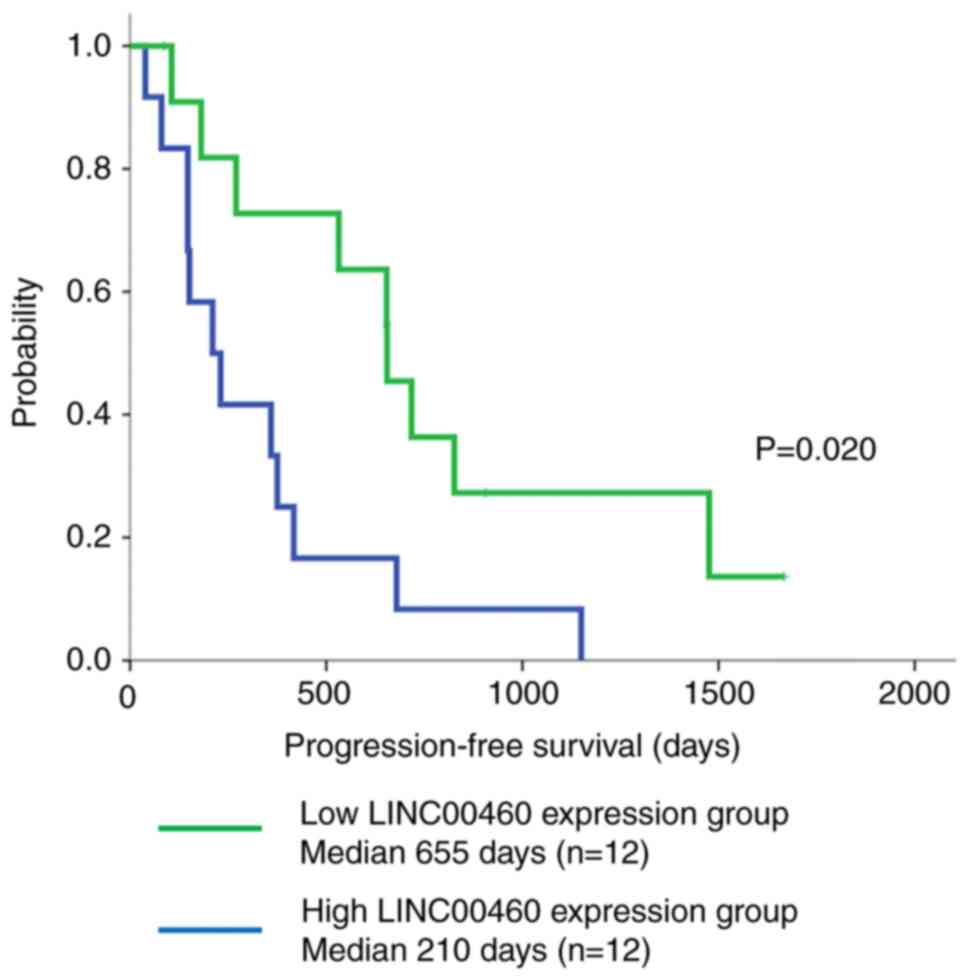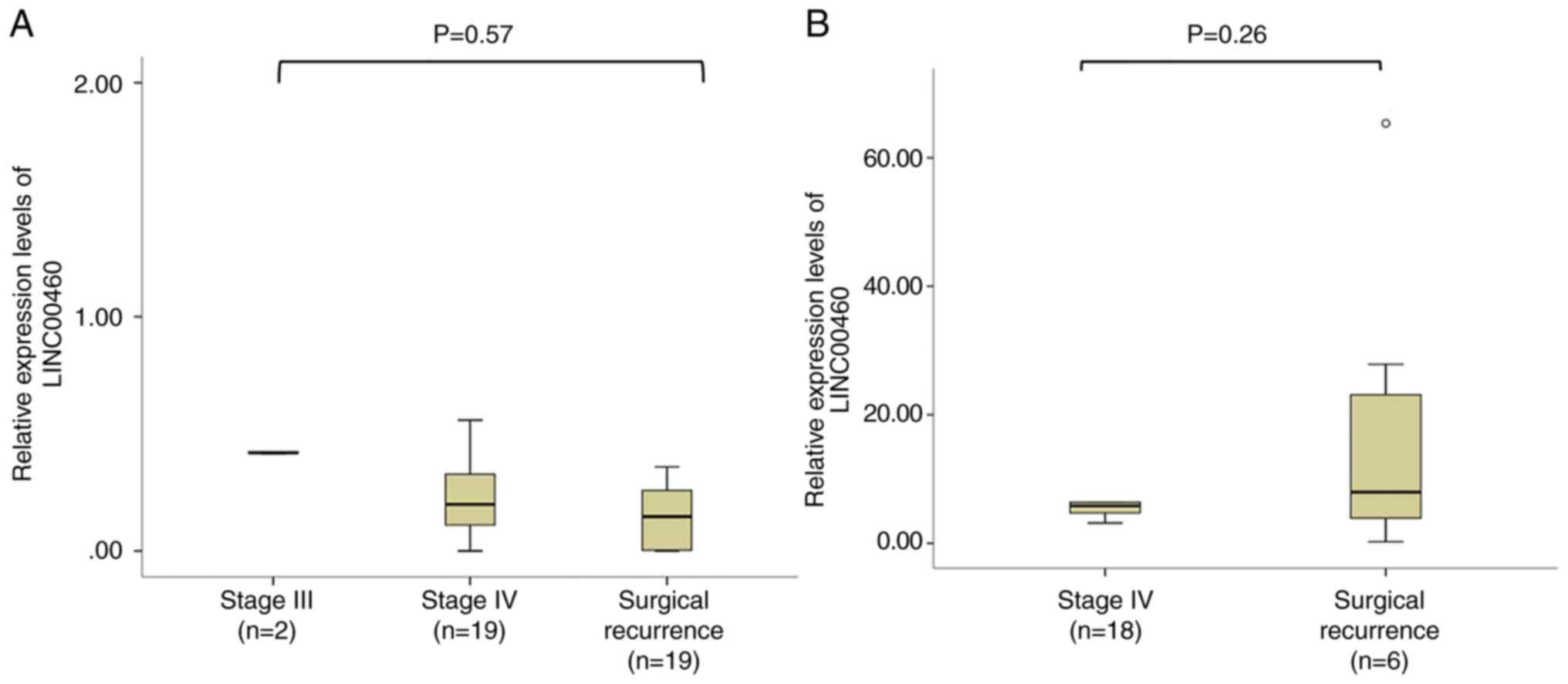|
1
|
Lynch TJ, Bell DW, Sordella R,
Gurubhagavatula S, Okimoto RA, Brannigan BW, Harris PL, Haserlat
SM, Supko JG, Haluska FG, et al: Activating mutations in the
epidermal growth factor receptor underlying responsiveness of
non-small-cell lung cancer to gefitinib. N Engl J Med.
350:2129–2139. 2004. View Article : Google Scholar : PubMed/NCBI
|
|
2
|
Paez JG, Jänne PA, Lee JC, Tracy S,
Greulich H, Gabriel S, Herman P, Kaye FJ, Lindeman N, Boggon TJ, et
al: EGFR mutations in lung cancer: Correlation with clinical
response to gefitinib therapy. Science. 304:1497–1500. 2004.
View Article : Google Scholar : PubMed/NCBI
|
|
3
|
Maemondo M, Inoue A, Kobayashi K, Sugawara
S, Oizumi S, Isobe H, Gemma A, Harada M, Yoshizawa H, Kinoshita I,
et al: Gefitinib or chemotherapy for non-small-cell lung cancer
with mutated EGFR. N Engl J Med. 362:2380–2388. 2010. View Article : Google Scholar : PubMed/NCBI
|
|
4
|
Mitsudomi T, Morita S, Yatabe Y, Negoro S,
Okamoto I, Tsurutani J, Seto T, Satouchi M, Tada H, Hirashima T, et
al: Gefitinib versus cisplatin plus docetaxel in patients with
non-small-cell lung cancer harbouring mutations of the epidermal
growth factor receptor (WJTOG3405): An open label, randomised phase
3 trial. Lancet Oncol. 11:121–128. 2010. View Article : Google Scholar : PubMed/NCBI
|
|
5
|
Zhou C, Wu YL, Chen G, Feng J, Liu XQ,
Wang C, Zhang S, Wang J, Zhou S, Ren S, et al: Erlotinib versus
chemotherapy as first-line treatment for patients with advanced
EGFR mutation-positive non-small-cell lung cancer (OPTIMAL,
CTONG-0802): A multicentre, open-label, randomised, phase 3 study.
Lancet Oncol. 12:735–742. 2011. View Article : Google Scholar : PubMed/NCBI
|
|
6
|
Yang JC, Wu YL, Schuler M, Sebastian M,
Popat S, Yamamoto N, Zhou C, Hu CP, O'Byrne K, Feng J, et al:
Afatinib versus cisplatin-based chemotherapy for EGFR
mutation-positive lung adenocarcinoma (LUX-Lung 3 and LUX-Lung 6):
analysis of overall survival data from two randomised, phase 3
trials. Lancet Oncol. 16:141–151. 2015. View Article : Google Scholar : PubMed/NCBI
|
|
7
|
Ramalingam SS, Vansteenkiste J, Planchard
D, Cho BC, Gray JE, Ohe Y, Zhou C, Reungwetwattana T, Cheng Y,
Chewaskulyong B, et al: Overall survival with osimertinib in
untreated, EGFR-mutated advanced NSCLC. N Engl J Med. 382:41–50.
2020. View Article : Google Scholar : PubMed/NCBI
|
|
8
|
Pan J, Cai X, Cao Z, Pan J and Zheng H:
Osimertinib in the treatment of EGFR mutation-positive advanced
non-small cell lung cancer: A meta-analysis. Pharmacology.
108:8–16. 2023. View Article : Google Scholar : PubMed/NCBI
|
|
9
|
Tsukita Y and Inoue A: First-line therapy
in non-small cell lung cancer patients with EGFR activating
mutations: A consideration of the clinical position of osimertinib
based on the subset of Japanese patients in the FLAURA study. Jpn J
Clin Oncol. 2022. View Article : Google Scholar : PubMed/NCBI
|
|
10
|
Le X, Puri S, Negrao MV, Nilsson MB,
Robichaux J, Boyle T, Hicks JK, Lovinger KL, Roarty E,
Rinsurongkawong W, et al: Landscape of EGFR-dependent and
-independent resistance mechanisms to osimertinib and continuation
therapy beyond progression in EGFR-mutant NSCLC. Clin Cancer Res.
24:6195–6203. 2018. View Article : Google Scholar : PubMed/NCBI
|
|
11
|
Piotrowska Z and Sequist LV: Tackling the
next generation of resistance in EGFR-mutant lung cancer. J Thorac
Oncol. 12:419–421. 2017. View Article : Google Scholar : PubMed/NCBI
|
|
12
|
Schoenfeld AJ, Chan JM, Kubota D, Sato H,
Rizvi H, Daneshbod Y, Chang JC, Paik PK, Offin M, Arcila ME, et al:
Tumor analyses reveal squamous transformation and off-target
alterations as early resistance mechanisms to first-line
osimertinib in EGFR-mutant lung cancer. Clin Cancer Res.
26:2654–2663. 2020. View Article : Google Scholar : PubMed/NCBI
|
|
13
|
Yu P, He X, Lu F, Li L, Song H and Bian X:
Research progress regarding long-chain non-coding RNA in lung
cancer: a narrative review. J Thorac Dis. 14:3016–3029. 2022.
View Article : Google Scholar : PubMed/NCBI
|
|
14
|
Chen X, Song J, Wang X, Sun D, Liu Y and
Jiang Y: LncRNA LINC00460: Function and mechanism in human cancer.
Thorac Cancer. 13:3–14. 2022. View Article : Google Scholar : PubMed/NCBI
|
|
15
|
Wang HX, Kang LJ, Qin X, Xu J and Fei JW:
LINC00460 promotes proliferation and inhibits apoptosis of
non-small cell lung cancer cells through targeted regulation of
miR-539. Eur Rev Med Pharmacol Sci. 24:6752–6758. 2020.PubMed/NCBI
|
|
16
|
Zhao H, Wang Y and Ren X: Nicotine
promotes the development of non-small cell lung cancer through
activating LINC00460 and PI3K/Akt signaling. Biosci Rep. 39:2019.
View Article : Google Scholar
|
|
17
|
Yue QY and Zhang Y: Effects of Linc00460
on cell migration and invasion through regulating
epithelial-mesenchymal transition (EMT) in non-small cell lung
cancer. Eur Rev Med Pharmacol Sci. 22:1003–1010. 2018.PubMed/NCBI
|
|
18
|
Li K, Sun D, Gou Q, Ke X, Gong Y, Zuo Y,
Zhou JK, Guo C, Xia Z, Liu L, et al: Long non-coding RNA linc00460
promotes epithelial-mesenchymal transition and cell migration in
lung cancer cells. Cancer Lett. 420:80–90. 2018. View Article : Google Scholar : PubMed/NCBI
|
|
19
|
Ma G, Zhu J, Liu F and Yang Y: Long
noncoding RNA LINC00460 promotes the gefitinib resistance of
nonsmall cell lung cancer through epidermal growth factor receptor
by sponging miR-769-5p. DNA Cell Biol. 38:176–183. 2019. View Article : Google Scholar : PubMed/NCBI
|
|
20
|
Nakano Y, Isobe K, Kobayashi H, Kaburaki
K, Isshiki T, Sakamoto S, Takai Y, Tochigi N, Mikami T, Iyoda A, et
al: Clinical importance of long non-coding RNA LINC00460 expression
in EGFR-mutant lung adenocarcinoma. Int J Oncol. 56:243–257.
2020.PubMed/NCBI
|
|
21
|
Livak KJ and Schmittgen TD: Analysis of
relative gene expression data using real-time quantitative PCR and
the 2(−Delta Delta C(T)) method. Methods. 25:402–408. 2001.
View Article : Google Scholar : PubMed/NCBI
|
|
22
|
Yao J, Gao R, Luo M, Li D, Guo L, Yu Z,
Xiong F, Wei C, Wu B, Xu Z, et al: Exosomal
LINC00460/miR-503-5p/ANLN positive feedback loop aggravates
pancreatic cancer progression through regulating T cell-mediated
cytotoxicity and PD-1 checkpoint. Cancer Cell Int. 22:3902022.
View Article : Google Scholar : PubMed/NCBI
|
|
23
|
Hellyer JA, White MN, Gardner RM, Cunanan
K, Padda SK, Das M, Ramchandran K, Neal JW and Wakelee HA: Impact
of tumor suppressor gene co-mutations on differential response to
EGFR TKI Therapy in EGFR L858R and exon 19 deletion lung cancer.
Clin Lung Cancer. 23:264–272. 2022. View Article : Google Scholar : PubMed/NCBI
|
|
24
|
Gilboa T, Garden PM and Cohen L:
Single-molecule analysis of nucleic acid biomarkers - A review.
Anal Chim Acta. 1115:61–85. 2020. View Article : Google Scholar : PubMed/NCBI
|
|
25
|
Crooke ST, Witztum JL, Bennett CF and
Baker BF: RNA-targeted therapeutics. Cell Metab. 27:714–739. 2018.
View Article : Google Scholar : PubMed/NCBI
|
|
26
|
Tasaki Y, Suzuki M, Katsushima K, Shinjo
K, Iijima K, Murofushi Y, Naiki-Ito A, Hayashi K, Qiu C, Takahashi
A, et al: Cancer-specific targeting of taurine-upregulated gene 1
enhances the effects of chemotherapy in pancreatic cancer. Cancer
Res. 81:1654–1666. 2021. View Article : Google Scholar : PubMed/NCBI
|















